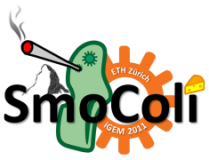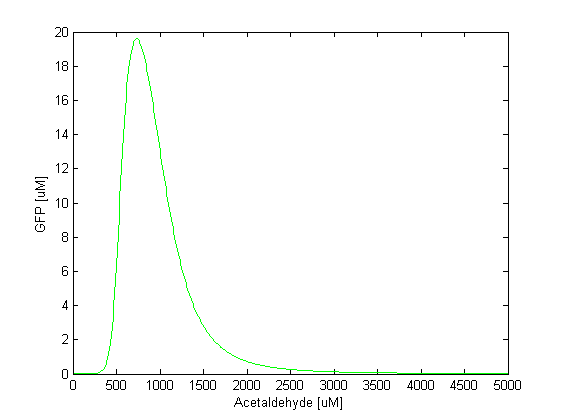Team:ETH Zurich/Achievements/Model Results
From 2011.igem.org
(→Feasibility Analysis) |
(→Feasibility Analysis) |
||
| Line 25: | Line 25: | ||
|{{:Team:ETH Zurich/Templates/Flash|name=flash_gfp_ss_sweep|url=/wiki/images/9/94/ETHZ-GFP_SS_Sweep.swf|width=250|widthP2=400|height=260|text='''Video 1: Steady state simulation sweep from 1 to 2500 mg/l acetaldehyde concentration in reservoir:''' 3D GFP concentration in mol/m<sup>3</sup>, 5 slices through the channel. Channel width: 2 mm, Channel length: 5 cm.}} | |{{:Team:ETH Zurich/Templates/Flash|name=flash_gfp_ss_sweep|url=/wiki/images/9/94/ETHZ-GFP_SS_Sweep.swf|width=250|widthP2=400|height=260|text='''Video 1: Steady state simulation sweep from 1 to 2500 mg/l acetaldehyde concentration in reservoir:''' 3D GFP concentration in mol/m<sup>3</sup>, 5 slices through the channel. Channel width: 2 mm, Channel length: 5 cm.}} | ||
| - | | | + | |} |
This acetaldehyde concentration is toxic for the cells. However, with single cell model parameters tuning, we got the band at lower acetaldehyde concentration (we haven't done the COMSOL simulation with those values yet). The tuning of the parameters doesn't affect the feasibility of our design at any way, since it just affects the input acetaldehyde concentration needed. | This acetaldehyde concentration is toxic for the cells. However, with single cell model parameters tuning, we got the band at lower acetaldehyde concentration (we haven't done the COMSOL simulation with those values yet). The tuning of the parameters doesn't affect the feasibility of our design at any way, since it just affects the input acetaldehyde concentration needed. | ||
Revision as of 00:55, 22 September 2011
| Modeling Results |
| ||
| By modeling and simulating our system we verified that it can actually be implemented in reality. We checked its feasibility, drew some conclusions and decided on a most suitable channel design. | |||
Feasibility AnalysisWe verified that our initial idea works and that we can actually get a moving GFP band in the channel responding to different input acetaldehyde concentrations! In order our smoColi bacteria to start reporting acetaldehyde in the air (when GFP band appears at the begining of the channel), system should be supplied with around 44.05 mg/L acetaldehyde. In order for the band to be able to form at the very end of the channel, the input acetaldehyde concentration should be 2420 mg/L. This acetaldehyde concentration is toxic for the cells. However, with single cell model parameters tuning, we got the band at lower acetaldehyde concentration (we haven't done the COMSOL simulation with those values yet). The tuning of the parameters doesn't affect the feasibility of our design at any way, since it just affects the input acetaldehyde concentration needed.
|
Process DesignAfter simulating our system in COMSOL, we came to the following conclusions that helped us designing the channel experimentally:
|
 "
"



